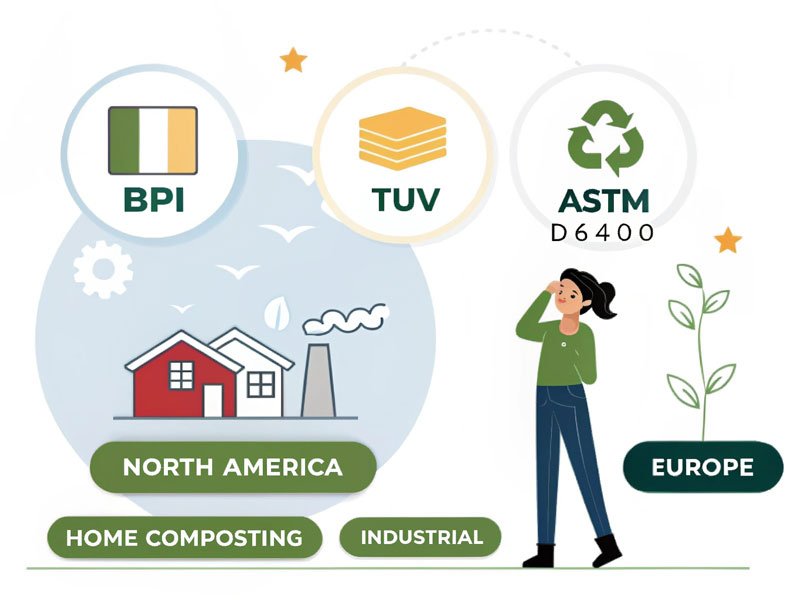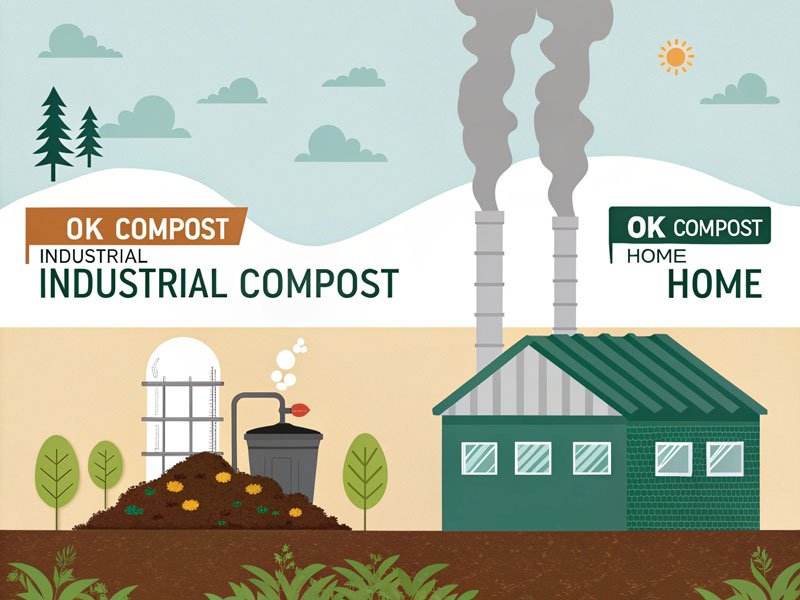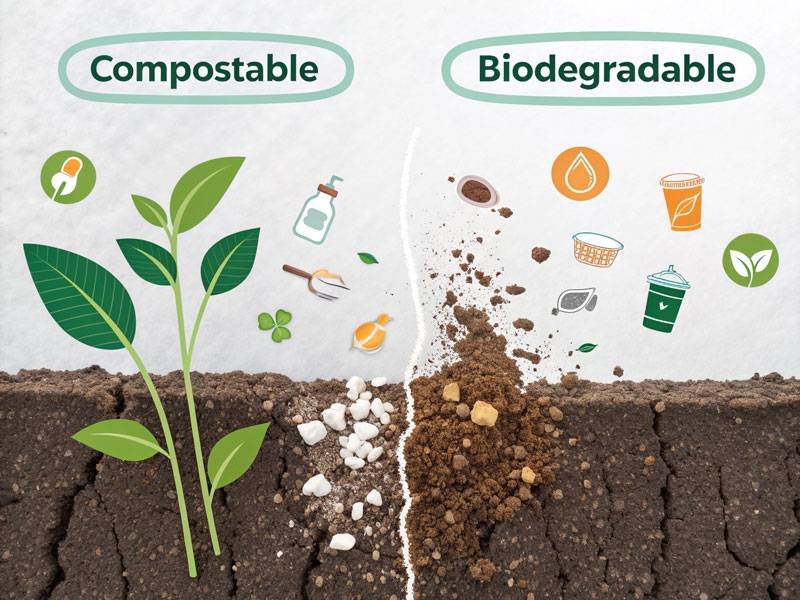In today's increasingly environmentally conscious world, the term "BPI Compostable" is increasingly common on product packaging, trash bags, food containers, and even mailing boxes. When a product is labeled "BPI Compostable," it's often assumed that anything labeled "green" is recyclable and biodegradable.
Have you ever wondered: Does a product meet BPI's compostable standards? What does BPI actually mean? Is it truly better for the environment? How can businesses and consumers ensure they're choosing the right product?
As a Chinese compostable bag manufacturer (The compostable certification number of Shandong Orizon Biomaterials Co., Ltd. is: 10529118 ) with 16 years of experience, this article will provide a detailed analysis of what bpi compostable certification means, why this certification is so important, including the BPI, TÜV Austria, and ASTM D6400, and how it benefits businesses, the environment, and responsible consumers.

What Does BPI Certified Mean
What Is BPI Certified Compostable
BPI (Biodegradable Products Institute) is the leading third-party certifier of compostable products in North America. BPI certification means that a product has been independently tested and certified according to ASTM D6400 or ASTM D6868 standards for composting in commercial composting facilities.
BPI compostable meaning the product has been tested and certified to break down in an industrial composting facility without leaving behind harmful residues, toxins, or plastic fragments.
BPI certification ensures that products:
- The product will biodegrade in a controlled composting environment.
- It leaves no toxic or harmful residues behind.
- The certification is based on standards such as ASTM D6400 (for plastics) or ASTM D6868 (for coatings on paper).
This is important because not all “eco-friendly” or “biodegradable” products meet strict composting requirements.
Materials Covered
- Compostable plastic bags
- Food packaging
- Cutlery and containers
- Compostable mailers

Why BPI Certified Matters for Businesses
The market is flooded with products claiming to be green, sustainable, or biodegradable. However, without third-party verification, these claims can be misleading—a practice known as greenwashing.
BPI certification matters because it is:
- Third-party verified: Products are tested by independent laboratories.
- Standardized: Certification follows scientifically recognized compostability standards.
- Trusted: Many municipalities, waste facilities, and eco-conscious businesses only accept or work with BPI-certified products.
Using BPI certified products ensures:
It complies with local composting program rules, which often only accept BPI-certified materials.
The product will break down safely in a commercial composting facility.
It will not harm compost quality or the environment.

TUV & ASTM D6400 Compostable Certifications
Besides BPI, other global compostable certification bodies include:
TÜV Austria (OK Compost)
- Offers OK Compost INDUSTRIAL and OK Compost HOME labels
- Recognized in Europe and globally
ASTM D6400
- U.S. standard that defines biodegradability in composting conditions
- Basis for both BPI and many international certifications
EN13432
- European compostability standard for packaging materials
These certifications help ensure products are compost-safe and suitable for both municipal and consumer use.

BPI vs. Other Compostability Certifications
While BPI is a major certification in North America, there are other important compostability certifications worldwide. Here's how they compare:
| Certification | Region | Composting Environment | Standard Used | Labeling |
|---|---|---|---|---|
| BPI | USA/Canada | Industrial | ASTM D6400 / D6868 | BPI logo |
| OK Compost Industrial | EU | Industrial | EN13432 | TÜV Austria |
| OK Compost Home | EU | Home compost | EN13432 + home test | TÜV Austria |
| AS4736 / AS5810 | Australia | Industrial / Home | AS certified | AIC logo |
Key Differences:
- BPI focuses on industrial composting only
- TÜV and some others also offer home compostability certification
- Some companies get multiple certifications to cover more markets
If your business ships globally, it’s best to choose a packaging supplier (like us) that meets both BPI and EN13432.
What are BPI Certified Compostable Products?
For Consumers:
- Compostable trash bags
- Food scrap liners
- Disposable plates and cutlery
- Coffee cups and lids
- Produce bags
For Businesses:
- Foodservice packaging (bowls, trays, utensils)
- Compostable poly mailers for e-commerce
- Dog waste bags
- Kitchen garbage liners for office or restaurant waste separation
Industries such as hospitality, restaurants, retail, and e-commerce are increasingly switching to BPI-certified alternatives to meet sustainability goals and municipal composting rules.

Benefits of Using BPI-Certified Compostable Products
Environmental Benefits
- Reduces plastic pollution in landfills and oceans
- Supports the circular economy
- Breaks down into nutrient-rich compost instead of microplastics
Regulatory Compliance
- Helps businesses meet municipal composting mandates
- Ensures products are accepted by commercial composters
Brand Image & Customer Trust
- Appeals to eco-conscious customers
- Demonstrates a genuine commitment to sustainability
- Helps B2B clients meet ESG and CSR goals
Disadvantages of Bpi Certified Compostable Products
Industrial Composting Required
- These products need high heat and controlled conditions—not all cities have composting infrastructure
- If sent to a landfill or incinerator, they won’t break down properly
Consumer Education
- Many people mistakenly throw compostable items into recycling or landfill
- Proper labeling and signage are crucial to ensure correct disposal
Cost
- BPI-certified products can be more expensive than plastic alternatives
- However, prices are falling as demand and production scale increase

"Biodegradable" VS "Compostable"
It's not surprising that many people don't understand the difference between "biodegradable" and "compostable." This is common, as many businesses confuse the two concepts. Composting, on the other hand, is more challenging.
Biodegradable:
A material whose original components can be broken down by microorganisms (bacteria and fungi) into simpler substances (biomass, carbon dioxide, and water) that are ultimately absorbed by the natural environment.
Biodegradation occurs naturally. The decomposition process is influenced by environmental factors, and the rate of decomposition varies depending on the material; for example, paper decomposes easily, while Styrofoam takes a very long time. It is worth noting that this can be done under aerobic or anaerobic conditions, with aerobic environments accelerating the decomposition time.
Biodegradation is influenced by factors such as the chemical composition of the material, storage conditions, and environmental factors such as temperature, moisture, light, and oxygen. In most landfills, the lack of sunlight, air, and necessary moisture significantly slows the biodegradation process.
Compostable:
Products or materials that biodegrade in a controlled composting environment (over several months to several years), contributing harmless organic matter to the soil.
Influencing factors: Water, oxygen, light, and a suitable organic environment. Compostable degradation involves a controlled composting environment, which requires water, oxygen, and suitable organic matter.
| Aspect | Compostable | Biodegradable |
|---|---|---|
| Timeframe | ≤180 days | Undefined |
| End Result | Nutrient-rich soil | Varies (could leave microplastics) |
| Certification | BPI, OK Compost | None or vague |
| Compost Facility Compatibility | Accepted | Usually rejected |
Don’t confuse “biodegradable” with “BPI compostable”—only the latter ensures reliable decomposition in industrial composting environments without harmful residues.
BPI Certification Requirements
Technical Standards:
ASTM D6400: Applicable to the compostability of plastic materials and products
ASTM D6868: Applicable to the compostability of plastic coatings composited with materials such as paper
Product Design Requirements:
- The product must completely biodegrade within a specified period of time under industrial composting conditions, leaving no harmful residues;
- Prohibited/Restricted Ingredients or Structures;
- The product must not contain high concentrations of heavy metals or other hazardous substances。
Documentation Requirements:
- The manufacturer must provide detailed product ingredient information, a description of the production process, and relevant test reports.
- Third-party testing is required. The product must be tested by an independent third-party laboratory according to ASTM D6400 or ASTM D6868, covering criteria such as biodegradability, disintegration, and the ecotoxicity of post-compost residues.
How Products Get BPI Certified
Getting a product BPI-certified is not as simple as slapping a logo on packaging. It involves a strict and transparent process:
Step 1: Submit Product for Review
The product manufacturer must provide detailed information about the product’s material composition, usage, and manufacturing process.
Step 2: Lab Testing
Products are tested by independent labs to assess how well they meet the following:
- Disintegration: The product physically breaks down during composting.
- Biodegradation: It is consumed by microorganisms.
- Eco-toxicity: The finished compost does not harm plants or the soil.
Step 3: Certification Review
If the product passes all tests according to ASTM standards, BPI grants certification.
Certification documents: https://bpiworld.org/certification-docs
Step 4: Logo & Labeling Approval
BPI provides clear labeling rules. The product must display:
- The BPI logo
- The certifying standard (e.g., ASTM D6400)
- Any relevant usage instructions (e.g., “For industrial composting only”)
Step 5: Ongoing Compliance
BPI certification is not permanent. The certification process can take several months to complete and is valid for three years, requiring recertification every three years.
Certifications do not need to be renewed annually, but annual surveillance audits are required to ensure continued compliance with standards. Retesting is also recommended if changes to formulations or materials are made.
Certification Fee Range:
Fees vary depending on the product and testing requirements. We recommend contacting BPI or an approved testing laboratory directly for a specific quote.

How to Identify BPI Certified Products
BPI Product Catalog:
Visit the BPI Product Catalog, a searchable database of more than 10,000 certified products broken down to specific companies and product numbers.
Use the search bar to find specific products by entering product type (e.g., “compostable bags”) or brand (e.g., “BioBag”).
The catalog allows you to download individual company product lists for easy verification by consumers, composting facilities, or businesses.
Check for the BPI certification mark:
Certified products typically have the BPI certification mark (swirl design) printed on the packaging, unless exempted due to space constraints or low contamination risk (e.g., straws, resins).
The mark should include the word “Compostable” and the BPI certification number to ensure authenticity.
Retailer and brand websites:
- Green Paper Products: Offers BPI-certified foodservice and packaging products with certification details on the website.
- Eco-Products: Lists its BPI-certified cups, plates, and packaging materials.
- Good Start Packaging: Offers a large collection of BPI-certified products and supports wholesale.
- Amazon: Search “BPI certified compostable” to find products from brands such as BioBag, Glad, and more.
Contact the manufacturer directly:
Contact the brand (e.g. BioBag, UNNI) or BPI (certification@bpiworld.org) to verify product certification status.
FAQ:
Where can these BPI-certified products be disposed of?
BPI-certified products can only be disposed of in commercial or industrial composting facilities and cannot be broken down in home compost piles. Acceptance depends on local waste disposal policies; some organic waste recycling programs accept these products, while others do not.
We recommend checking your local waste disposal agency's guidelines or using BPI's "Find a Composter" tool to confirm whether compostable products are accepted in your area. These products meet strict standards and must be kept under controlled conditions, such as high temperature and humidity, to fully decompose.
What does it mean if a bag is BPI compostable?
It means the bag has been tested and certified to break down in a commercial composting facility, leaving no toxic residues behind.
Is BPI certification mandatory?
While not legally mandatory, it’s often required by composting facilities and municipalities to accept products.
Is BPI compostable the same as biodegradable?
No. “Biodegradable” is a vague term without time or safety standards. BPI compostable products must break down within 90 days in industrial composting conditions and meet strict toxicity standards.
Can I compost BPI-certified products at home?
No. BPI certification is for industrial composting, which requires higher temperatures and controlled humidity.
Can I print the BPI logo once I pass the test?
Only licensed partners may display the BPI logo. Unauthorized use may result in legal consequences.
Conclusion
We manufacture a wide range of BPI-certified compostable bags and packaging for wholesale, OEM, and cross-border clients. Whether you’re a foodservice company, retail brand, or packaging distributor, we offer sustainable solutions that meet the highest compostability standards.
👉 Contact us today to discuss custom orders or request free samples.
Related Articals:
- What Are BPI Certified Compostable Bags Ultimate Guide
- The Science Behind BPI Certification: From Polymers to Compost
Source:





